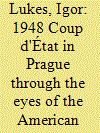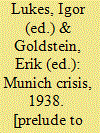| Srl | Item |
| 1 |
ID:
107064


|
|
|
|
|
| Publication |
2011.
|
| Summary/Abstract |
This article examines the dramatic events that transformed Czechoslovakia into a totalitarian dictatorship primarily from the perspective of the United States Foreign Service officers posted at the American Embassy in Prague. It is based on new archival sources, on interviews with former American Foreign Service and Intelligence officers, and on their unpublished mémoires.
|
|
|
|
|
|
|
|
|
|
|
|
|
|
|
|
| 2 |
ID:
044666


|
|
|
|
|
| Publication |
Lexington, Lexington Books, 1990.
|
| Description |
xxviii, 281p.
|
| Standard Number |
0669242268
|
|
|
|
|
|
|
|
|
|
|
|
Copies: C:1/I:0,R:0,Q:0
Circulation
| Accession# | Call# | Current Location | Status | Policy | Location |
| 032341 | 354.470725/RAA 032341 | Main | On Shelf | General | |
|
|
|
|
| 3 |
ID:
048141


|
|
|
|
|
| Publication |
London, Frank Cass, 1999.
|
| Description |
xi, 402p.Hbk
|
| Standard Number |
0714649953
|
|
|
|
|
|
|
|
|
|
|
|
Copies: C:1/I:0,R:0,Q:0
Circulation
| Accession# | Call# | Current Location | Status | Policy | Location |
| 042677 | 940.53112/LUK 042677 | Main | On Shelf | General | |
|
|
|
|
| 4 |
ID:
178367


|
|
|
|
|
| Summary/Abstract |
This article tackles two of the major questions in later twentieth-century international history, the origins and the end of the Cold War. Historians traditionally assumed that Moscow was determined from the outset to Sovietise Eastern Europe, once liberated from Nazism, and that this made the later confrontation with the Western powers inevitable. It will be shown here that the idea to install Moscow-friendly regimes in a Europe destroyed by war had been formulated by Kremlin officials already a decade earlier. The article also argues that the Western alliance became comfortable with the status quo it had previously denounced, and that it was reluctant to upset the East-West equilibrium of later years. In the aftermath of 1989, several Western politicians have claimed the laurels of victory over Communism, but it was the Soviet bloc countries who liberated themselves, despite pleas of officials in London, Washington, Paris, and Bonn to slow down or even suspend their reforms.
|
|
|
|
|
|
|
|
|
|
|
|
|
|
|
|